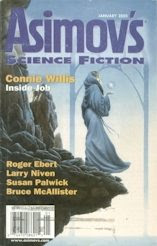 The Book of the Week is The Shadow of Alpha by prolific horror author Charles L. Grant, who passed away last week at the age of 64.
The Book of the Week is The Shadow of Alpha by prolific horror author Charles L. Grant, who passed away last week at the age of 64.This is the first printing, paperback original of Grant's first book, published in 1976. The Shadow of Alpha is the first in a trilogy of post-apocalyptic science fiction novels. The series is best noted for conveying a strong sense of dread, and so few readers were surprised when Grant switched to horror after completing this series. Grant developed a large following as a horror writer, noted for frightening his readers with suspense rather than gore. He occasionally returned to science fiction with light-hearted SF comedies under the name Lionel Fenn (one of several C.L. Grant pseudonyms), with such great titles as Kent Montana and the Really Ugly Thing from Mars and 668: The Neighbor of the Beast. In addition to his own fiction, Charles L. Grant was a successful editor, notably editing the Shadows series of original anthologies, which showcased some of the most talented fantasists and horror authors in the world.
By his own count, Grant wrote 78 books and edited 24 anthologies. He won two Nebula Awards and three World Fantasy Awards, was named a Living Legend by the International Horror Guild, and also received the Horror Writers Association' s Lifetime Achievement Award. He will be greatly missed by readers and by the entire field of fantastic literature.



